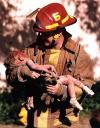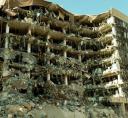april is the cruelest month
I worry that my capacity to empathize with sadness and tragedy has been destroyed. Most the time at work, I’m forced to put on a mien of detachment and objectivity. If I took everything bad that happens at work to heart, I’m pretty sure I would’ve quit a long time ago. Or I’d have committed suicide.
In the three years that I have been doing what I’m doing, I’ve witnessed so many people suffering from so many awful, unfair, and excruciating experiences.
On one hand, you have the people who did it to themselves. Their condition was completely preventable once upon a time, but no one ever intervened effectively, and now they’re going to die. Is there any one to blame? Is there any point in assigning blame to a 21 year old guy who is severely brain injured and who will most likely never wake-up ever again? Even if he did it to himself?
On the other hand, there are the people who have been capriciously struck down by some terrible rare disease that no one knows how to take care of. One day you’re living your normal life, taking care of your kids. They you get back pain, and you find out it’s a cancer that can’t be removed surgically, and it doesn’t respond to chemotherapy, and now it’s in your lungs as well, and they can’t get you off the ventilator without killing you. And the horrible thing is that you’re awake and alert during all this time, with a breathing tube stuck down your throat, and you can still at least write messages to your daughter, your husband, your brother, and then here we are in our white coats talking detachedly about your inevitable demise.
Am I even human anymore? Have I lost my soul?
So when I hear that Cho Seung-Hui kills 32 students at Virginia Tech, I really just shrugged. So what’s new? People die all the time, usually for unfair reasons.
It was hard to empathize with those distant people when right next to me I had a guy who is younger than me with a destroyed liver from drinking two fifths (1.5 liters) of Jack Daniels every day, who had vomitted and shat out around 6 liters (that’s about 1-½ gallons!) of blood in less than two hours right in front of me. We may have saved his life this time, but he’s just going to die some day, and even if he quit drinking now, he probably wouldn’t survive long enough until he was eligibile for a liver transplant. And in the room next to him was the 21 year old kid who had shot himself up with crystal meth and ended up going into cardiac arrest. We got his heart started up again, and it looks like he’s probably going to be able to breathe on his own, but the soul has vacated the premises. He is not technically brain dead. He’s on his way to becoming another Terry Schiavo if we don’t convince his family to let him go.
And still I think about all the people who have killed themselves with drugs, and the worst, really, are alcohol and cigarettes. They are slow, painful ways to die, in the worst possible ways. Frankly, I’d rather die instantaneously. With heroin, you stop breathing. With meth or coke, you could have a heart attack or a stroke.
But alcohol will rot your liver, and it takes a long time to do it, too. You know what, technically, we consider drinking more than 2 drinks a day (hard liquor, beer, wine, whatever) a serious problem, and I’ve met so many people who just blow this off, who drive around town in the middle of the night “only slightly buzzed” (And for some reason, it’s always the drunks that survive the 70 mph head on crashes. The 9 year old and the 7½ month old, and their mom and their dad—even if you manage to extract their mangled bodies from the wreckage, they almost never make it to the hospital.) But slowly and surely, your liver will die, and all sorts of terrible things happen when your liver doesn’t work, and perhaps the only saving grace is that you tend to be completely out of it towards the end.
I have no idea if the end-stage liver patient has any inkling at all of the physical fact that they are suffering and dying. If they’re not sleeping, they’re not exactly all there, and they’ll rant and rave deliriously, and talk to people who aren’t there, or complain about rats and pigeons flickering across their visual fields. And in time, they bleed catastrophically. I remember the last time I was here, we had at least four or five people die awful, protracted, long and drawn-out deaths, despite heroic measures—jamming a balloon into their gullets to try and stop the bleeding, having the interventional radiologists try and stop the bleeding. We gave them tons of blood products to support them and to try to stop the bleeding, and we tried to keep their kidneys from failing.
It was all futile. All I learned was how to let someone who is going to die go without having to suffer needlessly, which, I guess, is a useful skill, but sometimes you feel like an agent of Death.
The cigarettes are probably even slower, unless you’re lucky and get metastatic lung cancer. Once this stuff spreads outside of the lungs, you can die pretty quickly. But if you get emphysema instead, then you can go for a long, long time, with a perpetual sense of not being able to catch your breath. Even with oxygen, you can only walk about 25 paces before you get winded. And the more you smoke, the worse and worse it gets. Seriously, nicotine is more addictive than crack. You’d be better off being a crack addict, because when it kills you, it’ll be quick.
But I can’t help but wonder why it is that April always seems to be a harbinger of tragedy?
I think of the L.A. riots in 1992, which started on April 29, 1992. This is undoubtedly one of the most formative events of my adolescence. Hopefully, this will be the closest I’ll ever be to a war zone.
Then there was the Oklahoma City bombing that happened on April 19, 1995. Why is it that we always seem to forget that the terrorists that have killed the most Americans are actually white and live in this country?
Then there was the Columbine High School massacre on April 20, 1999, which, in reality, eerily resonated with me. How many of us felt outcast in our youth? That no one ever understood us? After surviving adolescence, you realize that it’s not a rare feeling.
In those by-gone days of innocence when you could say things, and people wouldn’t take you seriously about blowing-up things, even Bill Watterson recognizes that many of us really wanted to blow up our schools when we were kids.
But most of us never actually do it. There is still a difference between wishing and doing, no matter what the Thought Police say.
Then there are the less well-known but still significant stories that I remember.
On the last day of April in 1998, I was on the phone with brother who was watching TV, and he narrated me the drama of Daniel Jones, who parked his pickup truck on the carpool flyover leading from the south 110 to the west 105.  As I spoke with my brother, Jones shot himself while being broadcast live, inciting a firestorm about lurid television coverage. Jones had HIV and was apparently being denied treatment by his HMO, and his last moments were a political screed against managed care.
As I spoke with my brother, Jones shot himself while being broadcast live, inciting a firestorm about lurid television coverage. Jones had HIV and was apparently being denied treatment by his HMO, and his last moments were a political screed against managed care.
Then there are these stories that really haunt me. Last April, there was a weirdly synchronous string of violence, particularly against children, in the Korean American community in L.A. The most horrific was the story of Dae Kwon Yun, who intended to kill himself and his two kids by setting his SUV on fire. At the last moment, Yun chickened out, but he left his two kids to be immolated, to the point where there was barely anything left of them once the fire was put out.
I’ve learned pretty much to stop asking why. Why life is unfair, and why it’s usually the innocents who suffer, or the people who don’t know any better. The corrupt and the cunning generally survive and continue to commit evil deeds.
I wonder if one day, when I’m not faced with death on a daily basis, I’ll regain my sense of proportion, and once again be able to face the sorrow of death with honesty and empathy. Right now, I’m too busy protecting myself to be able to help others get through their time of anguish.





